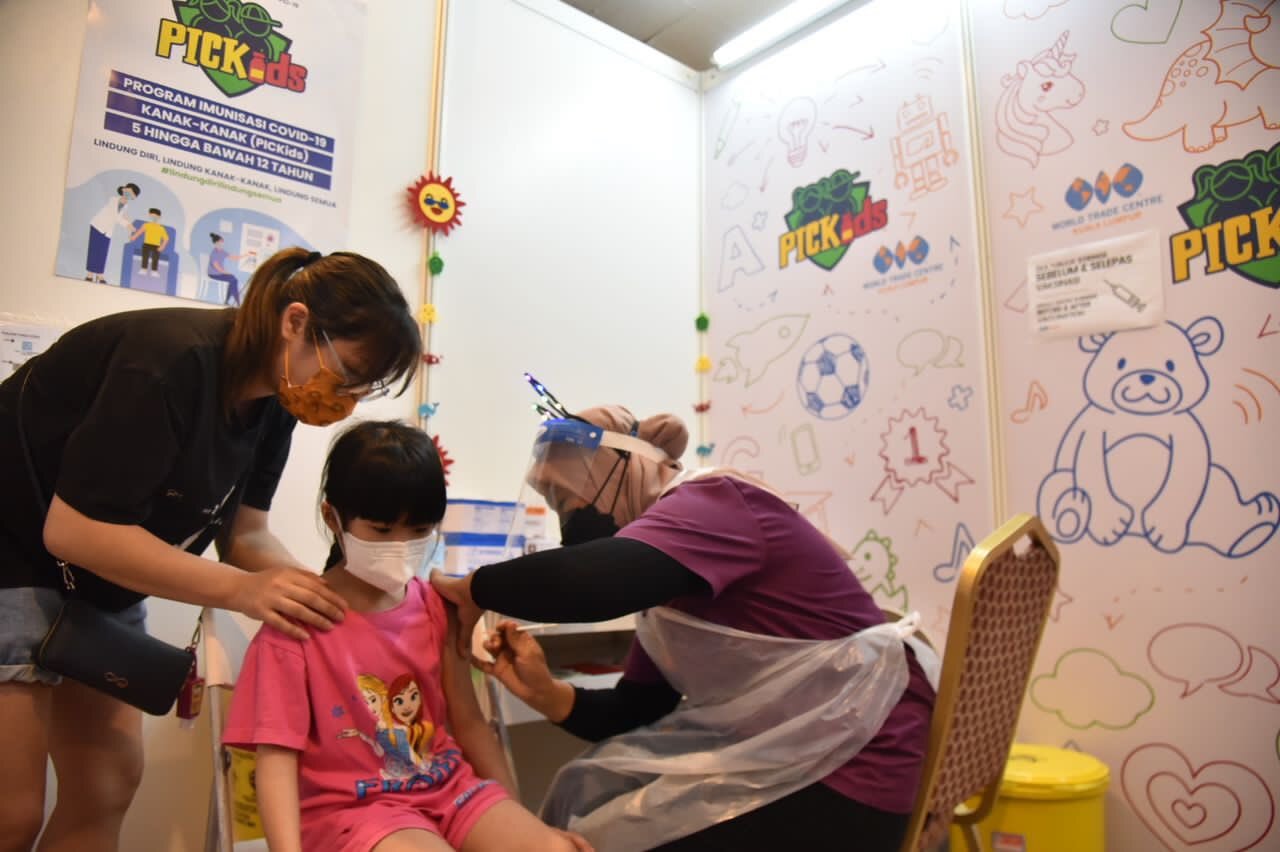KUALA LUMPUR, Feb 3 – Khairy Jamaluddin projects at least 50 per cent of children aged five to below 12 years to receive their first Covid-19 vaccine dose by the end of February, following the launch of the paediatric Covid-19 inoculation programme (PICKids) today.
The health minister added that about 70 per cent of school children (aged seven to under 12 years) will receive at least one dose of the specially formulated Pfizer-BioNTech’s 10 microgram (mcg) coronavirus vaccine for kids by the end of this month.
“For me, if we can get more than half for this cohort (children aged five to 11 years) by the end of February, that is a good target. But Deputy Health Minister Dr Noor Azmi Ghazali (who chairs the CITF-C for children) may want to go more than that.
“We have sufficient supply, God willing. The vaccines are being delivered everyday by Pfizer, but what is most important is to build confidence among parents so that they can register their children for vaccination,” Khairy told reporters after launching PICKids at the Tunku Azizah Hospital in Kuala Lumpur today.
“This is the last piece of the puzzle, immunising children as they have also returned to schools. We know that it is difficult for children to practice social distance. The nature of children — when they go back to school, they are with their friends — it’s very difficult to maintain social distance so it is important to give them as much protection as possible.”
Khairy said at least 15 per cent, or 517,107 children aged five to under 12, have been registered by their parents for coronavirus vaccination, including his youngest son aged six. His two other children have received their Covid-19 vaccine jabs under the PICK for adolescents programme.
While many are still taking a “wait and see” approach, Khairy is confident that the registration rate will be higher once children’s vaccinations are expanded to schools across the country.
Currently, Covid-19 vaccinations are available only in the Klang Valley at hospitals for immunocompromised children and those with comorbidities, and at three designated vaccination centres (PPVs) for children without medical issues, namely the Kuala Lumpur World Trade Centre, Axiata Arena in Bukit Jalil, and the Ideal Convention Centre in Shah Alam.
Under PICKids, parents are allowed to book a time and place, at their convenience, to vaccinate their children, unlike previous appointments that were issued automatically through the MySejahtera app.
Khairy also gave his assurance that restrictions imposed on unvaccinated adults aged 18 and above will not be applied to unvaccinated children. “We want to build confidence and allow parents to make informed decisions to vaccinate their children,” he said, adding that the Ministry of Health’s (MOH) expert group on vaccines has not recommended any booster shot for children at the moment.
“The decision to vaccinate children was not done in haste. The United States’ Food and Drug Administration approved the (Pfizer) vaccine for emergency use for children in October.
“Our experts took an additional few months to properly review the [effectiveness and suitability] of the mRNA vaccine by looking at data produced by countries that have started their inoculation programme for kids.
“It started with the US, Singapore, Australia, only then were we convinced, not just by looking at clinical data from the vaccine producers themselves, but we also by analysing data on real-world use — and we found that there are not many incidences of serious side effects other than the common side effects like fever.
“We want to make sure the last remaining segment of our population are vaccinated. We are working hard at the MOH so that a lot of the activities that we were used to doing, we can do again, including going back to school,” Khairy said.
Khairy said between January 1 and February 2, 2022, there were a total of 160 active education coronavirus clusters, with 108 clusters (67.5 per cent) involving boarding secondary schools, and a few others at regular secondary schools (12), primary schools (13), and pre-schools (10).
He added that 14 schools have temporarily been forced to close due to Covid-19 after risk assessment activities were conducted. “If we can separate those who are positive from the negatives, the schools will remain open. School closure is the last option.
“Out of the 160 active education clusters, what I want to highlight here is that there are zero Category Four and Five cases, meaning vaccinations work. Schools can stay open.
“If it’s forced to close, it will be temporary, but we want schools to open as much as possible,” Khairy said.








